 We all experience negative thoughts from time to time, and sometimes they can trigger strong emotions that affect our mood, behavior, and well-being. How can we manage these emotions in a healthy and effective way? In this post, we explore the concept of emotional regulation, a skill that helps us navigate the stormy seas of our feelings with mindfulness. We will learn how emotional regulation can help us calm our emotions, cope with negative thoughts, and cultivate a serenity that transcends the turmoil of the world.
We all experience negative thoughts from time to time, and sometimes they can trigger strong emotions that affect our mood, behavior, and well-being. How can we manage these emotions in a healthy and effective way? In this post, we explore the concept of emotional regulation, a skill that helps us navigate the stormy seas of our feelings with mindfulness. We will learn how emotional regulation can help us calm our emotions, cope with negative thoughts, and cultivate a serenity that transcends the turmoil of the world.
 We all have thoughts that trouble us, that linger in our minds and refuse to go away. Sometimes, these thoughts can be overwhelming, causing us to feel anxious, depressed, or hopeless. How can we cope with these negative thoughts in a healthy and effective way? In this post, we will explore the concept of mindful coping, a technique that helps us navigate the labyrinth of our thoughts with balance and constructiveness. We will learn how mindful coping can help us improve our problem-solving skills, regulate our emotions, and transform our negativity into resilience.
We all have thoughts that trouble us, that linger in our minds and refuse to go away. Sometimes, these thoughts can be overwhelming, causing us to feel anxious, depressed, or hopeless. How can we cope with these negative thoughts in a healthy and effective way? In this post, we will explore the concept of mindful coping, a technique that helps us navigate the labyrinth of our thoughts with balance and constructiveness. We will learn how mindful coping can help us improve our problem-solving skills, regulate our emotions, and transform our negativity into resilience.
 We all have thoughts and feelings that we sometimes wish we could get rid of. We may try to fight them, ignore them, or judge them, but they often come back stronger and more persistent. What if there was a better way to deal with them? A way that could bring us peace and harmony instead of conflict and suffering? In this blog post, we will explore the art of acceptance, a mindfulness practice that teaches us how to embrace our humanity and all its facets.
We all have thoughts and feelings that we sometimes wish we could get rid of. We may try to fight them, ignore them, or judge them, but they often come back stronger and more persistent. What if there was a better way to deal with them? A way that could bring us peace and harmony instead of conflict and suffering? In this blog post, we will explore the art of acceptance, a mindfulness practice that teaches us how to embrace our humanity and all its facets.
 In the vast tapestry of mindfulness, we uncover the delicate art of redirection—a subtle yet transformative practice that holds the power to reshape our connection with persistent, nagging thoughts. It is akin to shifting the spotlight from a dimly lit stage onto one brilliantly illuminated, where the shadows of negativity lose their menacing grip. This sub-practice, though seemingly subtle, wields transformative power, capable of fundamentally reshaping our relationship with those persistent and nagging thoughts that often haunt our mental spaces.
In the vast tapestry of mindfulness, we uncover the delicate art of redirection—a subtle yet transformative practice that holds the power to reshape our connection with persistent, nagging thoughts. It is akin to shifting the spotlight from a dimly lit stage onto one brilliantly illuminated, where the shadows of negativity lose their menacing grip. This sub-practice, though seemingly subtle, wields transformative power, capable of fundamentally reshaping our relationship with those persistent and nagging thoughts that often haunt our mental spaces.
 Mindfulness, dear travelers of the soul, graces us with the power of reduced reactivity. In the whirlwind of life, negative thoughts often become sirens, luring us into impulsive reactions. But mindfulness bestows upon us a precious pause, like a sturdy anchor amidst turbulent waters. With this pause, we can assess our thoughts, deciding whether they deserve our precious attention or if they are but fleeting clouds in the boundless sky of our consciousness. This, my friends, is the serene calm in the midst of the storm, the gift of reduced reactivity that empowers us to choose our path with wisdom.
Mindfulness, dear travelers of the soul, graces us with the power of reduced reactivity. In the whirlwind of life, negative thoughts often become sirens, luring us into impulsive reactions. But mindfulness bestows upon us a precious pause, like a sturdy anchor amidst turbulent waters. With this pause, we can assess our thoughts, deciding whether they deserve our precious attention or if they are but fleeting clouds in the boundless sky of our consciousness. This, my friends, is the serene calm in the midst of the storm, the gift of reduced reactivity that empowers us to choose our path with wisdom.
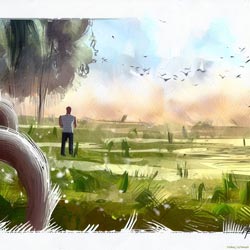 In the theater of our minds, we often find ourselves caught in the relentless drama of thoughts. Yet, mindfulness extends to us a precious gift: the art of creating space. Imagine, if you will, a stage with a pause, a breath, a silence before the next act. This space is crucial, for it liberates us from being mere actors bound to a script. In this intermission, we gain the freedom to choose how we respond to the thoughts that parade before us, breaking free from the shackles of automatic reaction.
In the theater of our minds, we often find ourselves caught in the relentless drama of thoughts. Yet, mindfulness extends to us a precious gift: the art of creating space. Imagine, if you will, a stage with a pause, a breath, a silence before the next act. This space is crucial, for it liberates us from being mere actors bound to a script. In this intermission, we gain the freedom to choose how we respond to the thoughts that parade before us, breaking free from the shackles of automatic reaction.
 As we walk this path of mindfulness, let us contemplate the art of non-judgmental observation. In the garden of our thoughts, we often hastily label the blooms as 'good' or 'bad.' But my friends, true mindfulness encourages us to be like a gardener who merely observes the flowers without judgment. In doing so, we untangle ourselves from the thorny judgments that give power to our thoughts. Instead, we hold them gently, like fragile petals in our hands, understanding that they do not define our worth.
As we walk this path of mindfulness, let us contemplate the art of non-judgmental observation. In the garden of our thoughts, we often hastily label the blooms as 'good' or 'bad.' But my friends, true mindfulness encourages us to be like a gardener who merely observes the flowers without judgment. In doing so, we untangle ourselves from the thorny judgments that give power to our thoughts. Instead, we hold them gently, like fragile petals in our hands, understanding that they do not define our worth.
 In this blog post I begin a series exploring the transformative power of mindfulness practices. Mindfulness fosters a heightened sense of awareness, making you more attuned to the thoughts that arise within your mind. Instead of being unconsciously consumed by negative thoughts, you develop the ability to recognize them as they begin to form. This awareness acts as a crucial first step because you can't change or manage something effectively if you're not even aware of it. When you start noticing negative thoughts early in their development, you have the opportunity to decide how to respond to them.
In this blog post I begin a series exploring the transformative power of mindfulness practices. Mindfulness fosters a heightened sense of awareness, making you more attuned to the thoughts that arise within your mind. Instead of being unconsciously consumed by negative thoughts, you develop the ability to recognize them as they begin to form. This awareness acts as a crucial first step because you can't change or manage something effectively if you're not even aware of it. When you start noticing negative thoughts early in their development, you have the opportunity to decide how to respond to them.
 In the heart of the American legal landscape, where justice should shine as a beacon of truth, an unsettling cloud of doubt lingers, casting a pall over the integrity of the highest echelons of the judiciary. The Supreme Court stands as a symbol of the nation's highest ideals, safeguarding justice and upholding the Constitution. Its decisions reverberate through history, shaping the course of laws and lives. Unfortunately, the Supreme Court finds itself enshrouded in shadows. These shadows are not merely a play of light; they are the harbingers of a fundamental crisis that threatens to erode the very foundation of justice.
In the heart of the American legal landscape, where justice should shine as a beacon of truth, an unsettling cloud of doubt lingers, casting a pall over the integrity of the highest echelons of the judiciary. The Supreme Court stands as a symbol of the nation's highest ideals, safeguarding justice and upholding the Constitution. Its decisions reverberate through history, shaping the course of laws and lives. Unfortunately, the Supreme Court finds itself enshrouded in shadows. These shadows are not merely a play of light; they are the harbingers of a fundamental crisis that threatens to erode the very foundation of justice.
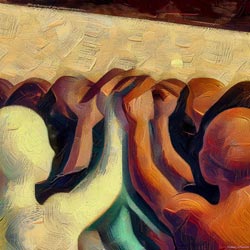 The concept of autocracy stands as a profound concern that shapes the course of societies. Autocracy, characterized by absolute power vested in a single individual or a select few, has far-reaching implications that span from human rights violations to societal disintegration and economic stagnation. This essay delves into the intricacies of autocracy, highlighting its forms, dangers, and ways to resist its encroachment.
The concept of autocracy stands as a profound concern that shapes the course of societies. Autocracy, characterized by absolute power vested in a single individual or a select few, has far-reaching implications that span from human rights violations to societal disintegration and economic stagnation. This essay delves into the intricacies of autocracy, highlighting its forms, dangers, and ways to resist its encroachment.
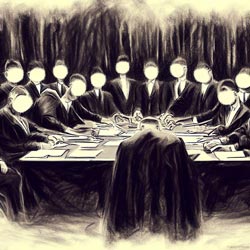 In the intricate tapestry of the United States judicial system, an unseen force shapes policies and decisions that resonate through courtrooms nationwide. The Judicial Conference of the United States stands as this guiding hand, an assembly of key figures weaving the fabric of justice itself. As an embodiment of wisdom and authority, its influence is paramount in maintaining fairness, efficiency, and accessibility within the federal courts.
In the intricate tapestry of the United States judicial system, an unseen force shapes policies and decisions that resonate through courtrooms nationwide. The Judicial Conference of the United States stands as this guiding hand, an assembly of key figures weaving the fabric of justice itself. As an embodiment of wisdom and authority, its influence is paramount in maintaining fairness, efficiency, and accessibility within the federal courts.
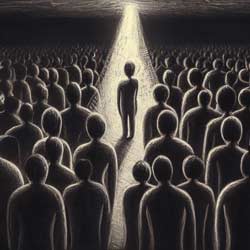 In this stirring monologue, "I Expect Better From My Neighbor," we are confronted with the harsh realities of societal apathy and indifference. Drawing on the author's disgust at our society's race to the bottom, the despair at the inaction of so many, and the horror of fear driven social paralysis; the monologue delves into the heart-wrenching disappointment, rage, and despair felt towards those who turn a blind eye to injustice. It is a powerful call to action, a plea for empathy, and a damning indictment of our collective cowardice and failure to uphold the values of fairness, justice, and compassion.
In this stirring monologue, "I Expect Better From My Neighbor," we are confronted with the harsh realities of societal apathy and indifference. Drawing on the author's disgust at our society's race to the bottom, the despair at the inaction of so many, and the horror of fear driven social paralysis; the monologue delves into the heart-wrenching disappointment, rage, and despair felt towards those who turn a blind eye to injustice. It is a powerful call to action, a plea for empathy, and a damning indictment of our collective cowardice and failure to uphold the values of fairness, justice, and compassion.
 The United States Constitution is the bedrock of American democracy, providing the guiding principles and values that define our nation. However, interpreting this foundational document is not a simple task. It requires a deep understanding of legal theories and philosophical perspectives, each offering a unique way to view the Constitution. This complexity arises from the Constitution's broad language, its historical context, and the ever-evolving societal norms that influence its interpretation. This journey through the landscape of constitutional interpretation offers a critical perspective on a pivotal aspect of American democracy.
The United States Constitution is the bedrock of American democracy, providing the guiding principles and values that define our nation. However, interpreting this foundational document is not a simple task. It requires a deep understanding of legal theories and philosophical perspectives, each offering a unique way to view the Constitution. This complexity arises from the Constitution's broad language, its historical context, and the ever-evolving societal norms that influence its interpretation. This journey through the landscape of constitutional interpretation offers a critical perspective on a pivotal aspect of American democracy.
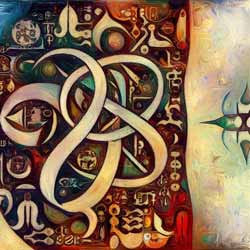 "The Nature of Reality - Twelve Perspectives" is an insightful essay that explores the understanding of reality from the vantage point of twelve diverse belief systems. It delves into the unique perspectives of Atheism, Buddhism, Christianity, Confucianism, Hinduism, Indigenous Religions, Islam, Jainism, Judaism, Sikhism, Taoism, and Zoroastrianism. Drawing on a range of scholarly works, the essay examines the fundamental concepts, teachings, and philosophies of each belief system, offering a rich tapestry of insights into how these traditions comprehend the nature of reality. By delving into the diverse perspectives, the essay highlights the complexity, depth, and interconnectedness of human spiritual and philosophical traditions.
"The Nature of Reality - Twelve Perspectives" is an insightful essay that explores the understanding of reality from the vantage point of twelve diverse belief systems. It delves into the unique perspectives of Atheism, Buddhism, Christianity, Confucianism, Hinduism, Indigenous Religions, Islam, Jainism, Judaism, Sikhism, Taoism, and Zoroastrianism. Drawing on a range of scholarly works, the essay examines the fundamental concepts, teachings, and philosophies of each belief system, offering a rich tapestry of insights into how these traditions comprehend the nature of reality. By delving into the diverse perspectives, the essay highlights the complexity, depth, and interconnectedness of human spiritual and philosophical traditions.
 This biography explores the life and work of René Descartes, one of the most influential figures in Western philosophy and science. Our discussion begins with his birth, continues with his education, military service, and travels across Europe. We discuss his groundbreaking contributions to philosophy, mathematics, and physics, including his development of Cartesian doubt, the Cartesian coordinate system, and mechanistic physics; all are examined in detail. The biography also delves into Descartes' personal life, his relationships, and the circumstances of his death in 1650. The narrative is enriched by a discussion of Descartes' posthumous reputation and the enduring influence of his ideas.
This biography explores the life and work of René Descartes, one of the most influential figures in Western philosophy and science. Our discussion begins with his birth, continues with his education, military service, and travels across Europe. We discuss his groundbreaking contributions to philosophy, mathematics, and physics, including his development of Cartesian doubt, the Cartesian coordinate system, and mechanistic physics; all are examined in detail. The biography also delves into Descartes' personal life, his relationships, and the circumstances of his death in 1650. The narrative is enriched by a discussion of Descartes' posthumous reputation and the enduring influence of his ideas.
 This comprehensive essay explores the multifaceted nature of Borderline Personality Disorder (BPD), a mental health condition characterized by emotional instability, impulsivity, unstable relationships, and identity disturbance. The essay delves into the historical background, diagnostic criteria, prevalence, causes, and common misconceptions surrounding BPD. It further examines the symptoms, diagnostic process, and comorbidities associated with the disorder. The impact of BPD on interpersonal relationships and family life is explored, highlighting the challenges faced by family members and strategies for support.
This comprehensive essay explores the multifaceted nature of Borderline Personality Disorder (BPD), a mental health condition characterized by emotional instability, impulsivity, unstable relationships, and identity disturbance. The essay delves into the historical background, diagnostic criteria, prevalence, causes, and common misconceptions surrounding BPD. It further examines the symptoms, diagnostic process, and comorbidities associated with the disorder. The impact of BPD on interpersonal relationships and family life is explored, highlighting the challenges faced by family members and strategies for support.
- Game Theory, An Introduction
- Flat Earth Theory, Facepalm
- What is a Trigger Warning?
- Is Buddhism a Fork from Hinduism
- Venue in the United States Legal System
- Enigma of the Lunar Deception - A Study in Shadows
- Identity - Unraveling 'Cisgender'
- The Teleological Argument
- Gun Control Is Necessary Now
- Immigration Reform, A Complex Imperative






